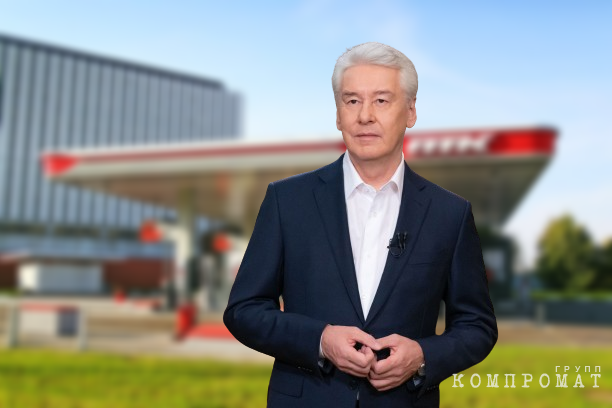Sobyanin’s team enters into dubious deals through the Central Telecommunications Company?
Among the institutions controlled by the Moscow government, there are those whose activities suggest that their task is to “spin” budget funds and transfer the property they own into private hands. One of these structures is the Central Fuel Company (CTK JSC), which was created back in the 90s with the aim of providing the capital with fuel, but today specializes in “providing loans and other types of credit.” The TsTK is controlled by the City Property Department and has been declaring losses for several years, despite hundreds of millions of budget rubles passing through it and an increase in the authorized capital to 22 billion by receiving a budget subsidy. In 2019, CTK was noted for the sale of Bereg LLC, which belonged to it, which owned the Ilyichevo boarding house near Moscow, located on a land plot of 35 hectares near the presidential residence Novo-Ogarevo. The new owners of the promising asset were Albert Imanilov and Roman Agababaev, associated with the notorious billionaires, owners of the Kievskaya Ploshchad group, God Nisanov and Zarakh Iliev, in whose interests they had already concluded transactions. Also controlled by CTK, the company “Mezhregionrazvitie” (LLC “MRR”), during the course organized by the state corporation “DOM. RF” auction, bought five former buildings of the Ministry of Economic Development, after which the Moskomarkhitektura was located in them. Today, the MRR used as a “gasket” is in the process of being eliminated. CTK, which concludes billion-dollar transactions and declares losses, takes out loans itself. One of the creditors was the company OEK-Finance, also controlled by the City Property Department and at one time involved in a criminal scandal: a criminal case was opened against its general director Andrei Baibarov for the theft of 282 million rubles by concluding fictitious contracts.
CTK switches from fuel to credits
From publications “Kommersant” follows that “Central Fuel Company” (JSC “CTK”), was created by the Moscow government to provide the capital with fuel. It was back in 1997, he headed the TsTK Yuri Shafranik, in 1993-1996. served as Minister of Fuel and Energy. Since then, as they say, a lot of water has passed under the bridge, not only the management has changed, but also the specialization of the company. Today in open sources its main activity is stated as “providing loans and other types of credit”.
Considering the control of the CTK capital City Property Departmentit seems that the team Sergei Sobyanin created a “pot” to finance certain projects. In fact, this is how it is; there is no longer any talk about fuel for Moscow. Information about company owners since January 2022 not disclosedonly its manager is known organization. This function is performed JSC “Asset Development” – another structure, controlled capital government.
Having become familiar with the financial indicators CTK, doubts inevitably arise that the company can lend to anyone, since it has been operating at a loss for years. In particular, at the end of 2022, CTK declared revenue in the amount of 158.8 million and losses in 1.9 billion rubles. A year earlier, revenue amounted to 240.1 millionlosses – 17.3 billion rubles. In 2019, revenue – 256.8 millionlosses – 3.6 billion.
At the same time, solid budgetary finances pass through the CTK: it acts as a customer for a total of 180 government contracts more than 593 million. Impressive size too authorized capital company exceeding 22 billion 69 million rubles. An interesting point: according to the official report on financial results, in 2022, the procedure for increasing the authorized capital of the Central Telecom Company was completed based on the order of the department, due to the budget subsidy received in 2019 in the amount of 11.47 billion rubles.
The “Kings of Real Estate” “moored” to the “Shore”
We will return to the history of lending later, but for now let us pay attention to one important circumstance. In a number of cases, the Moscow mayor’s office was involved in the process of transferring assets registered to it into private ownership. Naturally, we are talking about people close to high-ranking officials in the capital. An example would be LLC “Bereg”, managing boarding house “Ilyichevo” in the village of Ilinskoye, Krasnogorsk district, Moscow region, located on a plot of land area 35 hectares next to the presidential residence Novo-Ogarevo.
It is known that before the revolution “Ilyichevo” belonged to the Romanov imperial family, and during the Soviet period high-ranking party functionaries settled here. Until April 2019 owner Bereg LLC, and therefore the boarding house near Moscow, was the Central Fuel Company, which sold the asset to two individuals – Albert Imanilov And Roman Agababaev.
The parties, for obvious reasons, did not announce the cost of the transaction, but here’s what wrote Kommersant about her:
In general, it seems that the site was prepared for sale in advance. It turns out that back in 2014 Evgeniy Sosedov from the regional “Society for the Protection of Historical and Cultural Monuments” published a petition, in which he drew attention to the fact that cultural heritage sites were being illegally demolished on the territory of Ilyichevo. And in 2017, “Bereg” still achieved exceptions parts of the Ilyichevo buildings from the register of such objects.
Now is the time to remind about the new owners of precious hectares near Moscow – Albert Imanilov and Roman Agababaev. By information the same Kommersant, both turned out to be connected with the co-owners of the group “Kyiv Square”the notorious “kings of Russian real estate” God Nisanov And Zarakh Ilievin whose favor they had previously you bought Velozavodskaya market and shopping center “Prague”.
In July 2019, Imanilov left the list co-owners “Berega” and took his place Darvin Izraev. No more commercial structures for him not issuedbut his business partner Agababaev owns shares in numerous companies, one way or another, affiliated with the beneficiaries of Kievskaya Ploshchad. By the way, God Nisanov is considered a businessman close not only to Sergei Sobyanin, but also to the governor of the Moscow region Andrey Vorobyov. Billionaire is advisor Vorobyov on a voluntary basis, and in addition, in 2019 he bought it out 10% of the development group “Airplane”which includes the company “Plane of two capitals”where 25% belong to the brother of a government official, a businessman Maxim Vorobyov.
Billion dollar deal of Interregional Development
This is by no means the only example of fraud involving Moscow real estate involving the Central Fuel Company.
Among the enterprises controlled by CTK, noteworthy LLC “Mezhregionrazvitie” (MRR), specializing in consulting on business and management issues. Co-owners MRR is represented by CTK and its affiliated LLC “Sofia Embankment”.
Currently, Interregional Development is in the process of liquidationafter completion of which, and settlement with creditors, his authorized capitalexceeding 3.3 billion rubles, will be returned to the founders. That is, all the same TsTK. In November 2019, the company became the winner auctionhaving bought for 3.37 billion rubles five former buildings of the Ministry of Economic Development on 1st Tverskaya-Yamskaya and 1st Brestskaya streets in Moscow, with a total area of 29.5 thousand square meters.
Organizer the bidding was carried out by a state corporation “HOUSE. RF”. The reason for the sale was the relocation of the Ministry of Economic Development and a number of other ministries and departments (Ministry of Industry and Trade, Ministry of Telecom and Mass Communications, Rosimushchestvo, Rostourism, etc.) to the territory “Moscow City”, where “HOME. RF” for 25 billion rubles bought it out 75 thousand “squares” of office real estate in the complex “IQ-quarter” at the company “Gals-development”controlled VTB.
The further fate of the premises that became the property of the MRR was quite interesting: already in December 2019, they housed Committee for Architecture and Urban Planning of Moscow. How reported Interfax, officials intended to involve the buildings in commercial circulation to cover the costs of purchasing expensive space in Moscow City. However, their conversion into a business center required significant financial costs, and as a result, the objects were purchased by Mezhregionrazvitie. But the officially announced cost did not even come close to covering the costs of DOM. RF”.
The meaning of the participation of the CTK structure in the transaction remained unclear. Was the purchase made solely for the purpose of “attaching” the Moskomarkhitektura? Or did the capital’s officials use MRR as a “layer” for the implementation of another scheme, and are now writing the company “for scrap” as unnecessary?
Theft case at OEC-Finance
So, CTK made billions of dollars in transactions, while at the same time remaining unprofitable. Moreover, she herself raised borrowed funds, in particular, among her creditors is JSC “OEC-Finance”, specializing on investments in securities. Information about the founders of this organization in open sources nonebut on the network she is the only one shareholder called the Moscow City Property Department, which has been headed since February 2017 Maxim Gaman.
Enormous budget funds pass through OEC-Finance, as well as through the Central Transport Commission: the enterprise acted as a customer in 153 government contracts in total more than 1.2 billion rubles. In 2022, OEC-Finance’s revenue amounted to395.4 million, profit – 225 million. But a year earlier, with revenue of 475 million rubles the company went to minus on 1.7 billion. In 2020, revenue was declared in 969.3 millionAnd losses V 2.3 billion rubles.
It turns out that at a certain stage one unprofitable structure of the city hall lent to another? From the outside it looks like transferring budget finances from one pocket to another.
Against this background, we recall a high-profile corruption scandal associated with the initiation of a criminal case of theft 282 million rublesin which the general director of OEC-Finance became a defendant Andrey Baibarov. As the investigation established, finances were withdrawn by signing fictitious agreements with those controlled by him JSC “OFSK”which was led by Tatyana Gurshchenkova. In July 2017, the court sentenced Baibarov to 3.5 years in a general regime colony, Gurshchenkov to 2 years of suspended imprisonment.
Those involved in the scheme Olga Kovaleva And Ekaterina Golosheva were convictedrespectively, to 2.5 years in a general regime colony and 2 years probation.
It is noteworthy that Baibarov was released from prison on parole in 2018, and as noted TASS, without compensation for damage caused. Apparently, part of the stolen finances was spent on “resolving issues”? Be that as it may, OEC-Finance continues to “master” budget funds today. Moreover, sometimes it does this together with the Central Fuel Company, where unique specialists work in investments and distribution of assets into the “right” hands.









